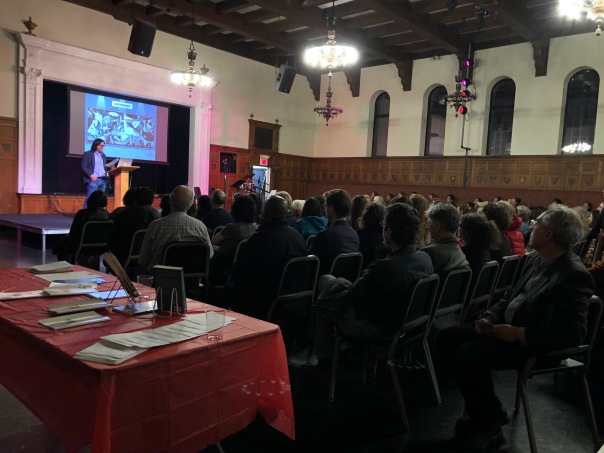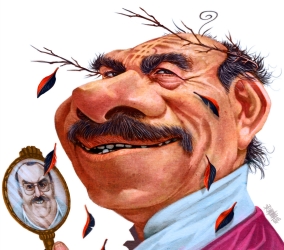
Pedro X. Molina spoke at the Voices of Freedom event on October 4. Photo by Robert Colley/ICOA.
More than 100 people gathered at the Community School of Music and Arts on October 4 to welcome Pedro X. Molina, his wife Urania Espinoza, and their two sons to Ithaca with music, food, dance, and conversation.
“Voices of Freedom 2019” was highlighted by a folkloric dance demonstration by Espinoza and an illustrated talk by Molina on the power of political cartooning and the deeply disturbing situation in his native Nicaragua.
Alderman Seph Murtagh read a proclamation from Mayor Svante Myrick extending a formal welcome to the Molina family and declaring the day “Ithaca City of Asylum Day” in the City of Ithaca.
Molina is Ithaca City of Asylum’s seventh writer-in-residence. He is the first cartoonist and the first from Latin America.
In his talk, he described how cartoonists have rankled – and sometimes helped unseat – the powerful for centuries. He showed examples of the work of the 19th century cartoonist Thomas Nast, who bedeviled New York political operator William “Boss” Tweed, and Washington Post cartoonist Herblock, who landed on Richard Nixon’s “enemies list” in the 1970s.
“You can see the trend here: the more ridiculous, abusive and corrupt a politician is, the more they hate humor and criticism,” Molina said.
He reserved his most forceful remarks for Nicaragua’s current president, Daniel Ortega, and his wife, vice president Rosario Murillo. Ortega, who led a popular revolution in the 1970s, has come to resemble the brutal dictator he helped depose, Molina said.

Nicaraguan president Daniel Ortega and the reflection of Anastasio Somoza, the dictator he helped depose in 1979. Cartoon by Pedro X. Molina
“Fraud, repression, corruption, abuses and killings have been rising steadily for a decade,” he said as he displayed several of his own cartoons. He then described how the situation rapidly deteriorated after nationwide protests against a change in the social security law in April 2018. Since then, he said, roughly 400 people have been killed by police or vigilantes, most from single bullets to the head or chest. About 800 people have been jailed.
“The situation for independent journalism of course also got worse and worse,” he continued. “Journalists were harassed, beaten, and robbed in the streets by the forces of the regime. Radio stations were burned and newspapers started having problems printing their daily editions because the government wouldn’t let them import the paper they needed for the presses.”
He described his own family’s frantic departure on Christmas Day last year, soon after the offices of his main outlet, Confidencial, were raided and subsequently taken over by the police. Cartoonists’ and journalists’ organizations referred him to the International Cities of Asylum Network, which alerted ICOA of his situation. Board member Gail Holst-Warhaft fronted the airfare with her personal credit card, and the group went about finding the family housing, winter clothes, a car, and legal representation.
“Thanks to them, I’m safe, my family is safe, and despite everything that we have gone through, I haven’t missed a single day of posting my daily cartoon denouncing what is happening in my country,” Molina said, holding back tears.
ICOA also connected Molina to Ithaca College, which offered him a position as a Visiting International Scholar in Residence in the Honors Program.
The event was cosponsored by the Latino Civic Association of Tompkins County, Group 73 of Amnesty International, Buffalo Street Books, Cornell’s Latin American Studies Program, and PEN America’s Artists at Risk Connection. It was supported by funds from the New York State Council on the Arts, administered by the Community Arts Partnership of Tompkins County.
In brief opening remarks, ICOA board chair Jonathan Miller explained that the annual Voices of Freedom event is meant to align with Banned Books Week, which calls attention to the importance of free expression and the dangers of censorship.
“Tonight we celebrate messy, energetic, provocative discussion in the media and the arts,” Miller said. “We celebrate the pushing and stretching and crossing of boundaries. We celebrate a blossoming international movement to provide refuge to people at risk, and we celebrate Ithaca’s place in that movement.”
The event also served as an opportunity for community members to support ICOA’s work. If you would like to help, please visit the “donate” page on this site or go directly to the online giving portal on GiveGab.


Pingback: After a police raid, a Nicaraguan cartoonist has found sanctuary in the United States - f1tym1